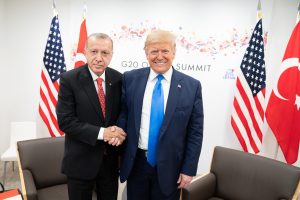by Daniel Luban
The last couple months have seen the spread of a particular argument about the war in Syria among members of the self-described “anti-imperialist” left. This line of thought argues that the war (along with the Arab Spring more broadly) cannot be considered a true “revolution” and thus the left should be wary of supporting anti-Assad forces — not merely with military or material support, but even sympathy or solidarity. What constitutes a “revolution” is not always spelled out, but Tariq Ali (who was among the first to make this argument) defines it in the loosely Marxist sense of “a transfer of power from one social class (or even a layer) to another that leads to fundamental change,” and he takes the lack of such an explicit class struggle in the Syrian war to be proof that the left should resist siding either with Assad or his opponents.
Recently the argument was revived by Asa Winstanley of the Electronic Intifada. After protests caused Middle East Monitor to take Winstanley’s piece down, it was republished by the leftist magazine Jacobin, whose editors describe themselves as holding “a plurality of positions on Syria” but consider the piece to be a “useful contribution to the discussion” and publish it in order “to further this dialogue”. (This is all well and good, and I disagreed with Middle East Monitor‘s initial decision to remove the piece, but I’m not entirely clear which “dialogue” the Jacobin editors are hoping to further. As far as I can tell, all their coverage of Syria has taken a similar line — namely, that there’s little moral difference between the two sides and that the left should avoid getting behind either one.)
I am by no means a Syria expert (although neither, as far as I can tell, are Ali or Winstanley). Nor do I have any clear suggestion for how those of us in Western countries should respond to the Syrian war. I think the left was correct to oppose the Obama administration’s recent push to bomb Syria, not least because it would have done nothing to end the war. And it’s certainly possible that the rebels have been taken over by hardline Islamists to such an extent that we should be wary of rooting for them to triumph — although determining whether this has happened would require a much more fine-grained knowledge of the situation on the ground than I (or Ali, or Winstanley) possess. (Incidentally, it’s been disheartening how many leftists who are perfectly capable of distinguishing various strands of Muslim militancy when discussing Palestine or Pakistan have, in the Syrian context, adopted the kind of monolithic view of Islamist totalitarianism that more properly belongs on the right.)
In any case, this argument for the moral equivalence of the two sides is deeply unconvincing. The problem with the argument isn’t so much that it gives the wrong answer to the question it poses. The problem is that it asks the wrong question altogether.
Let’s assume that the struggle against Assad does not qualify as a “revolution” in the classic Marxist sense or something similar to it. The implicit premise of Ali’s and Winstanley’s argument seems to be that if this is true, then the claims of Assad’s opponents to our support — let’s simply say our moral support, setting aside arguments about military intervention by Western governments — would fall away. But why is this the case? After all, it’s hard to think of many groups of people anywhere who are engaged in large-scale action that would meet Ali’s or Winstanley’s strict criteria for “revolution”. Does it follow that none of them deserve our support?
To take a couple of examples that Western “anti-imperialists” have an easier time wrapping their heads around: Palestinians in the occupied territories are not currently engaged in anything that we could plausibly call a “revolution,” but it doesn’t follow that we should be indifferent when they are bombed or driven from their land. Similarly, the residents of Pakistan’s tribal areas are not engaged in “revolution,” but it doesn’t follow that we should be indifferent when they are blown up by drone strikes.
It’s quite possible, in fact likely, that most of the Syrians opposing Assad don’t aim to impose a world-historical Revolution of the sort that would satisfy many Western leftists — that they simply want to remove the regime that has bombed them, gassed them, starved them, tortured them, and driven them from their homes. It’s hard to see why this forfeits their claims to our moral support.
Given the weakness of this argument from “revolution,” it’s not surprising that its proponents make a set of subsidiary arguments designed to show that there is no real difference between the two sides. None of these are much stronger.
For instance, Ali suggests that we “do not know with certainty” whether it was the regime or the oppositions that perpetrated the Aug. 21 chemical attack in Ghouta. This may have been a defensible claim in early September, when his piece was published, but it has become steadily less so ever since. Likewise, Winstanley points to the Syrian Observatory for Human Rights‘ statistics showing that “the majority of [those killed] are combatants — and the majority of those on have been on the pro-Assad side,” which he takes to discredit the media’s “untenable narrative about a revolution of unarmed Syrian protesters which only took up arms after being shot down by the evil Assad regime.” Now, it’s not clear how any view about the origins of the war can be discredited by statistics about what has happened since it got going. More to the point, even if it’s true that the majority of combatant fatalities have been from Assad’s forces, this does nothing to dispel the widely-accepted conclusion that the majority of civilian fatalities have been killed by the regime.
As stated, none of this is to imply any position about what (if anything) Western governments should do in response to the Syrian crisis, or what the solution to it should look like. Like many people, I’ve struggled with this question and don’t have any real answer. Generally, I remain sympathetic to the anti-interventionist position, since no one has provided any proposal for Western intervention that would actually solve the conflict rather than exacerbate it. But opposing outside military intervention does not require us to adopt the attitude that there are no moral stakes to the war, or that the sides are equally culpable. The readiness with which many leftists have moved to the latter positions has been dismaying.
Photo: Civilians near Ma’arrat An-Numan. Credit: Shelly Kittleson/IPS






How about letting the Syrians choose their leaders in a free and fair election? That after all was part of the constitutional agenda of Syria before the US-NATO- GCC and Israel decided to wage their clandestine and not so clandestine war against the Syrian regime. All of this Western intellectual mumbo jumbo and geopolitical chess doesn’t seem to mean much to Syrians except for the carnage and disruption it has caused. By the way, the CIA and UN earlier this year postulated that the Assad regime had the overwhelming support of the Syrian people, including many who had been disaffected with it. So, maybe it’s time to get out once and for all and let them have their country.
Left, Right, With Us, Against Us. Western, Eastern. Who really knows what is going on, except that the death toll and displaced civilian population of Syria is the result of individuals sitting far away from the actual war being waged by proxy from others. So far, the Western powers have made a shambles of the various countries they’ve engaged war in. Doesn’t matter which side one sits on, but the end result is “clusterfuck to the extreme. Unfortunately, lessons are not learned, but repeated in the hope that the next one will be the right one.
Thank you for debunking two of the most widely propagated reasons some are using to equate both sides of the Syrian conflict equal measure of blame. There is a Yiddish saying, “To make no choice, is in itself a choice.”
Armies can fight battles, but it takes effective politics to end a conflict. Syria is what happens when a society doesn’t have a political class worth a damn on either side. The country desperately needs political scientists, and not satellite channel propagandists with Ph.Ds.
I was in Tartous until September 2013, and I know even those in the pro regime areas are sick of Assad and the war. But the country has no viable civil opposition Syrians can get behind on a national level. I don’t blame many on the Left for not knowing which side to get behind. Frankly, as this stand, there is no side that is palatable enough to warrant support. The country desperately needs a third way, and its the opposition that has to get its act together and provide that third way.
In this line of reasoning, were does the logistic coordination of the USA and the abhorrent Takfiri forces sponsored by the Saudi Royals fit in?
Thank you for an excellent article, with the pathetic and predictable responses straight from Press TV, screeching about ‘Takfiri forces’ (is the person using the term a Muslim and, if not, why is he/she using this extremely subjective term which is a term used by a Muslim to describe another/others as apostate as though it were somehow relevant?) while ignoring Assad’s fighter jets, helicopter gunships, ballistic missiles, surface to surface missiles, cluster bombs and incendiary bombs, underlining how right it is.
Meanwhile, another reader who has very evidently never lived under a totalitarian dictatorship feels confident that a hereditary totalitarian dictator would host free and fair elections…this grotesque lie also works in Uzbekistan, where Islam Karimov, uncannily, always wins the ‘free and fair’ elections by a landslide majority… Though of course the same commenter would claim to oppose Karimov if the people rose up against him since he is more ovrertly Western backed than Assad and doesn’t make empty speeches about ‘anti-imperialism’ and ‘opposing zionism’ (those who believe either know less than nothing about what’s happening in Syria or indeed about Hafez Assad’s support for the death squads in the Lebanese refugee camps in the 1980s).
Meanwhile on Planet Earth, which these commenters don’t appear to have visited recently, Assad, whose regime tortured prisoners for both the CIA and British intelligence services in Washington’s interminable ‘War on Turr’, is, increasingly overtly back in Washington’s good books (and back in its War on Turr again anyway, with the ‘American intelligence community’ – a contradiction in terms – fearing that Israel may be threatened by Assad’s fall. And, of course, most in the West would rather see whole Arab (Sunni Muslim) populations destroyed than see Israel’s hegemony be endangered…
According to neoconservative/Obama darling Ryan Crocker, “We need to start talking to the Assad regime again” about counterterrorism and other issues of shared concern…It will have to be done very, very quietly. But bad as Assad is, he is not as bad as the jihadis who would take over in his absence.”
http://www.nytimes.com/2013/12/04/world/middleeast/jihadist-groups-gain-in-turmoil-across-middle-east.html?partner=rss&emc=rss&smid=tw-nytimesworld&pagewanted=all&_r=0